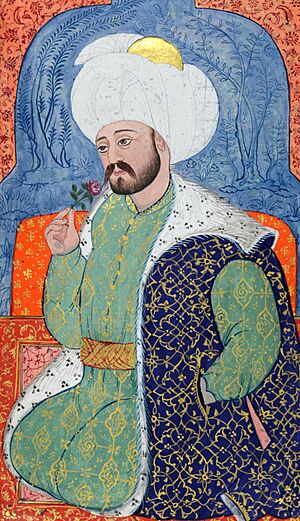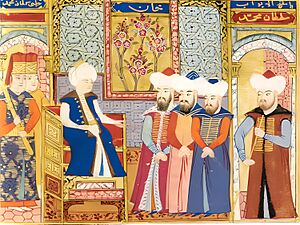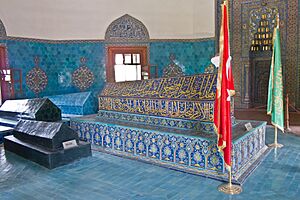Mehmed I facts for kids
Quick facts for kids Mehmed I |
|||||
|---|---|---|---|---|---|

Miniature of Mehmed I from 16th century manuscript
|
|||||
| Sultan of the Ottoman Empire (Padishah) | |||||
| Reign | 5 July 1413 – 26 May 1421 | ||||
| Predecessor | Interregnum (1402–1413) Bayezid I |
||||
| Successor | Murad II | ||||
| Co-rulers (claimants) |
See list
|
||||
| Sultan of Anatolia | |||||
| Reign | 1403 – 5 July 1413 | ||||
| Born | c. 1386 Bursa, Ottoman Sultanate |
||||
| Died | 26 May 1421 (aged 34–35) Bursa, Ottoman Sultanate |
||||
| Burial | Green Tomb, Bursa, Turkey | ||||
| Consorts | Emine Hatun Şahzade Hatun Kumru Hatun |
||||
| Issue Among others |
Murad II Selçuk Hatun Mustafa Çelebi |
||||
|
|||||
| Dynasty | Ottoman | ||||
| Father | Bayezid I | ||||
| Mother | Devlet Hatun | ||||
| Religion | Sunni Islam | ||||
| Tughra |  |
||||

Mehmed I (born around 1386 or 1387 – died May 26, 1421) was an important ruler of the Ottoman Empire. He was the Sultan from 1413 to 1421. People often called him Mehmed Çelebi, which means "the noble-born." He was also known as "The Restorer" because he brought the Ottoman Empire back together after a difficult time.
Mehmed I was the son of Sultan Bayezid I. After his father was defeated in a big battle, Mehmed and his brothers fought each other for control of the empire. This period was called the Ottoman Interregnum (1402–1413). Mehmed managed to win this long struggle. He first took control of Anatolia (modern-day Turkey) and then the European parts of the empire, known as Rumelia. By 1413, he had reunited the Ottoman state. He ruled until his death in 1421. He made the central government strong again and expanded the empire's lands in Europe.
Contents
Early Life and the Ottoman Civil War
Mehmed was born in 1386 or 1387. He was the fourth son of Sultan Bayezid I. When he was about 13 years old, he became a governor in a region called Rûm Eyalet. This was a common practice for Ottoman princes to gain experience.
In 1402, a powerful ruler named Timur defeated Mehmed's father, Sultan Bayezid I, in the Battle of Ankara. Bayezid I was captured. This battle caused a lot of chaos in the Ottoman Empire. Mehmed and his brothers were saved from the battlefield. Mehmed was helped by Bayezid Pasha, who later became his top advisor, known as the Grand Vizier.
At that time, the Ottoman Empire did not have clear rules about who would become Sultan next. Any son could try to take the throne. After their father's defeat, Mehmed and his brothers, Süleyman, İsa, and Musa, began a civil war. This war lasted for 11 years and is known as the "Ottoman Interregnum." During this time, Mehmed had to act as a vassal, meaning he had to show respect to Timur, who was still very powerful.
Becoming Sultan and Rebuilding the Empire
After winning the long civil war, Mehmed crowned himself Sultan in the city of Edirne in 1413. Edirne was in the European part of the empire. He made Edirne one of the most important cities. He is often called the "second founder" of the Ottoman Sultanate. This is because he successfully brought the empire back together after it had almost fallen apart.
Soon after Mehmed became Sultan, his brother Mustafa Çelebi appeared. Mustafa had been captured by Timur along with their father. He asked Mehmed to share the empire. Mehmed refused and easily defeated Mustafa's forces. Mustafa then went to the Byzantine city of Thessaloniki. The Byzantine emperor, Manuel II Palaiologos, agreed with Mehmed to send Mustafa away to an island.
Mehmed also faced challenges from his nephew, Orhan. Orhan was seen as a possible threat to Mehmed's rule. There was a plan by the Byzantine emperor to use Orhan against Mehmed. However, Mehmed found out about this plan. Orhan was then blinded for his betrayal, which was a harsh punishment at the time.
The long wars had also made the people of the empire feel uncertain and troubled. A strong religious movement started, led by a wise Muslim scholar named Sheikh Bedreddin. He believed in reducing differences between rich and poor people. His movement became very popular, especially in the European and western Anatolian parts of the empire.
In 1416, Sheikh Bedreddin started a rebellion against the Sultan. After four years of fighting, Mehmed's Grand Vizier, Bayezid Pasha, captured Bedreddin. He was then executed in the city of Serres in 1420.
Later Years and Legacy

Mehmed I ruled the reunited empire for only eight years. However, he had been the most powerful brother during the 11-year civil war. He was the real ruler of most of the empire even before his final victory.
Before he died, Mehmed wanted to make sure his son, Murad II, would become the next Sultan safely. He had his nephew Orhan Çelebi blinded. He also sent two of his other sons, Yusuf and Mahmud, to be held by the Byzantine Emperor Manuel II. This was to ensure that his brother Mustafa, who was still a threat, would remain in custody.
Mehmed I was buried in Bursa. He built a beautiful mausoleum for himself near a famous mosque he also built. This mosque is called the Green Mosque because of its green tiles. Mehmed I also finished another mosque in Bursa that his grandfather had started. He also built a school and a place to feed the poor near his mosque and mausoleum. He generously supported these places.
Family Life
Consorts
Mehmed I had three known wives or consorts:
- Emine Hatun: She was the daughter of a ruler from the Dulkadirids. She married Mehmed in 1403. Many believe she was the mother of Murad II.
- Şahzade Hatun: She was the daughter of Dividdar Ahmed Pasha. Some historians think she might have been the real mother of Murad II.
- Kumru Hatun: She was a slave concubine.
Sons
Mehmed I had at least five sons:
- Murad II (1404–1451): He became the next Sultan of the Ottoman Empire.
- Mustafa Çelebi (1408–1423): Also known as Küçük Mustafa, he challenged Murad II for the throne but was defeated and executed.
- Mahmud Çelebi (1413 – August 1429): He is buried in Mehmed I's mausoleum in Bursa.
- Yusuf Çelebi (1414 – August 1429): He is also buried in Mehmed I's mausoleum in Bursa.
- Ahmed Çelebi: He died when he was a baby.
Daughters
Mehmed I had at least eight daughters:
- Selçuk Hatun (around 1407 – October 25, 1485): She was the daughter of Kumru Hatun. She married two times and had children.
- Ilaldi Sultan Hatun (died 1444): She married a ruler of the Karamanids in 1425 and had six sons.
- Hatice Hatun (1408–1442): She married Karaca Paşah.
- Hafsa Hatun (died 1445): She is buried in Mehmed I's mausoleum. She married Mahmud Bey and had children.
- Incu Hatun: She married Isa Bey in 1427.
- Ayşe Sultan Hatun (1412–1469): She is buried in Mehmed I's mausoleum. She married a ruler of the Karamanids in 1427.
- Şahzade Sitti Hatun (born 1413): She is buried in Mehmed I's mausoleum. She married Sinan Paşah in 1427.
- Fatma Sultan Hatun: She married Kıvameddin Kazim Bey.
See also
 In Spanish: Mehmed I para niños
In Spanish: Mehmed I para niños
 | William Lucy |
 | Charles Hayes |
 | Cleveland Robinson |

